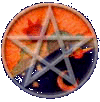|
Runes (Celtic runes) are an alphabetic script used by the peoples of Northern Europe from the first century c.e. until well
into the Middle Ages. In addition to their use as a written alphabet, the runes also served as a system of symbols used for
magic and divination. Runes fell into disuse as the Roman alphabets became the preferred script of most of Europe, but their
forms and meanings were preserved in inscriptions and manuscripts.
Older than the New Testament, the Runes have lain fallow for more than 400 years. The Runes were last in current use in
Iceland during the Middle Ages. The wisdom of the Rune Masters died with them. Little remains but the standing Rune stones,
the sagas, the far-flung fragments of runic lore, and the 24 Runes themselves.
There is no firm agreeement among scholars as to where and when runic writing first made its appearance in Western Europe.
Before Germanic peoples possessed any form of script, they used pictorial symbols that they scratched onto rocks.
The practice of divination (sortilege) was cultivated among Northern Italic as well as Germanic peoples, one using letters
the other symbols. Numerous runic standing stones can be seen in the British Isles, in Germany and throughout Scandinavia.
Runic symbols have been carved into pieces of hardwood, incised on metal or cut into leather that was then stained with
pigment.
The most common Runes were smooth flat stones or pebbles with symbols or glyths painted on one side. The practicioner
would keep them in a pouch, shake them and scatter the pebbles on the ground. Those falling with glyphs upward were then interpreted.
Below you can browse the celtic rune alphabet, the names are alphabetized, or you can browse them by their symbols. click
on the picture for more information on each rune
 |
 |
|
ALGIZ
|
ANSUZ
|
BERKANA
|
DAGAZ
|
EHWAZ
|
|
EIHWAZ
|
FEHU
|
GEBO
|
HALGALAZ
|
INGWAZ
|
|
ISA
|
JERA
|
KENAZ
|
LAGUZ
|
MANNAZ
|
|
NAUTHIZ
|
OTHALA
|
PERTHRO
|
RAIDHO
|
SOWILO
|
|
TEIWAZ
|
THURISAZ
|
URUZ
|
WUNJO
|

BLANK RUNE
|
|
 |
 |
|

